#king urien
Text
Queen Guinevere and Morgan le Fay
Sister with a similar-sounding name: Guinevak, Morgause
Understudy Best Friend: Isolde, Sebile
"Deutercanonical" Daughter: Melora, "Pulzella Gaia"
"Forgotten" Son: Loholt, Ywain
Race: Giant ("Merch y Gawr"), Fairy ("la fee'")
The "Husband": Arthur (Vulgate ver.), Urien
Boyfriends Boy-toys Male associates:
Guinevere: Lancelot, Gosengos, Yder, etc.
Morgan: Accolon, Huneson, Ogier, etc.
#Arthuriana#Arthurian legend#Arthurian mythology#Queen Guinevere#Morgan le Fay#Gwenhwyfach#Morgause#Isolde#Sebile#King Arthur#Lancelot#Sir Lancelot#Loholt#Sir Ywain#Melora#Pulzella Gaia#Sir Accolon#King Urien#Ogier the Dane#Edern ap Nudd#Please don't hurt me#Don't know if I should add Archfedd#Welsh myth
9 notes
·
View notes
Text

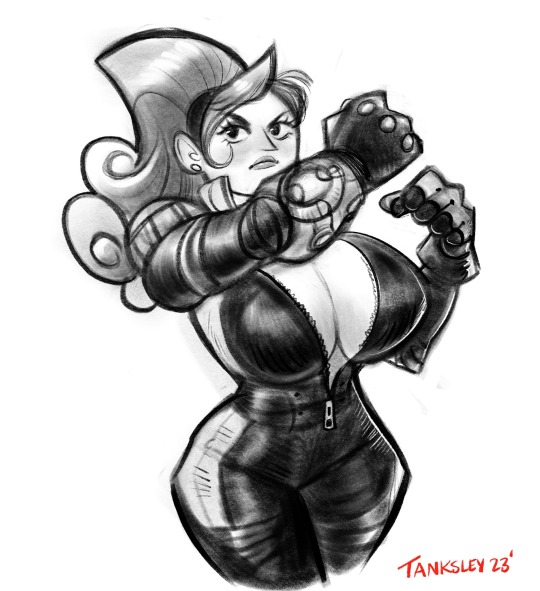
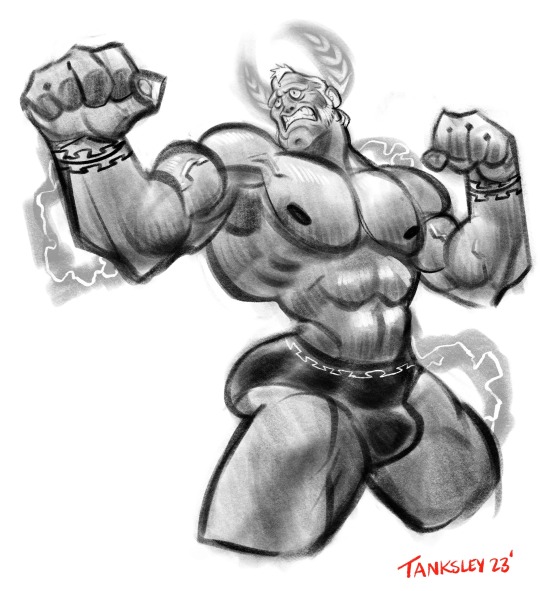

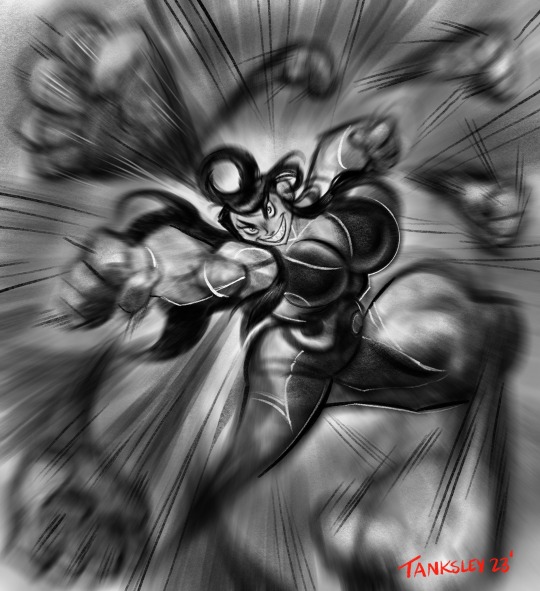

I really like sketching
#illustration#my art#art#gaming#digital art#fighting games#fgc#video games#capcom#street fighter#urien#scorpion#mortal kombat#netherrealmstudios#netherrealm studios#darkstalkers#morrigan#lien Neville#king of fighters#KoF#king of fighters maximum impact#snk#tekken#ling xiaoyu#xiaoyu#Seth#tekken 3
37 notes
·
View notes
Text
The Whumps of March 2024: "Vengeance"
A series of vignettes based on Arthurian legend, collected on AO3 here.
Morgause was losing patience. “What do you expect me to say, Morgan? Arthur is the High King now. And our brother, in case you’ve forgotten.”
“Brother,” Morgan snarled, slamming her goblet in anger. “The son of the man who killed our father! Enslaved our mother! Sold us like pawns to his allies, turned us from our home and—"
“Yes, Morgan, I know why you hate Uther,” Morgause said pointedly. “So perhaps you should be happy that he is dead.”
Morgan’s gaze smoldered. Morgause held her breath for a moment, only mostly sure that her sorcerous sister wouldn’t lash out at her words.
“Arthur killed your Lot, didn't he?”
She spoke softly, but the words hung heavily in the air for a long moment.
“Yes,” Morgause said finally, icily. “Not personally, mind you. That was King Pellinore, as my sons are accustomed to remind me. But I have no interest in revenge. It was a war, and we lost. A wise queen accepts what is."
Morgan sneered. "So you'll accept the same treatment that our mother was forced to."
"We tried to take Arthur's throne. Because—” she spoke loudly, as her sister tried to interrupt, “like your Uriens, we imagined that we had a certain right to it, and were willing to make great risks to achieve it. That ended poorly for us, though Arthur has been noble in his victory.
"I’ve learned from my mistake, sister. Perhaps you should as well.”
#Arthurian legend#Arthurian mythology#TheWhumpsOfMarch2024#Morgan le Fay#Morgause#King Lot#Uriens#King Arthur#Uther Pendragon
3 notes
·
View notes
Text
Here comes Arthur and Morgan le Fay’s deadly sibling drama 🤣
.......................
Morgan: (steals arthur’s excalibur and scabbard and replaces them with fakes. Then she sends the real one to Accolon via dwarf express)
Accolon: (immeidately uses the sword and scabbard to fight with the first knight he saw which was arthur coz they were both fighting for other lords)
Arthur: why the heck am i not OP anymore? Im bleeding???
Nimueh: damn. The king is in danger
Accolon: i am winning muahahahah
Nimueh: no you are not (magicks excalibur out of accolon’s grip)
Arthur: (retrieves the real excalibur and throws the scabbard as far as possibe)
Accolon: (is now hit by arthur)
Arthur: i should kill you damn it. But whats your name?
Accolon: im accolon of gaul from the round table of king arthur
Arthur: (is sad) why the treachery? Who sent you?
Accolon: my lover my lady queen morgan le fay wants me to be king and slay the king arthur
Arthur: nooooooooo i trusted her than anyone else even above my own wife
Accolon: pray sir what is your name
Arthur: im the King Arthur you idiottttt
Accolon: aaaaa have mercy
Arthur: you shall have my mercy
Accolon: (is dead after 4 days coz his wounds were too great)
Arthur: send his body to my sister as a gift
......
Morgan le fay: hahaha arthur is dead time to kill my husband, king uriens. Girl fetch me his sword!
Girl: ok my lady...
Girl: awake prince owain, your mom is gonna kill your dad!!!
Owain: ok go fetch the sword and go back to her
Girl: here is the sword milady
Morgan le fay: hahah ur dead now
Owain: mother no! U demon!!! If u werent my mother i would have taken your head off! Merlin may be the devil’s son by i was borne by an earthly demon myself!
Morgan le fay: son forgive meeee
Owain: alright but promise you wont do that again!
Morgan le fay: i promise!!!
.....
Announcement: accolon is dead!!!!
Morgan le fay: conceal dont feel dont let them know
Morgan le fay: hey sis, i need to go somewhere real quick.
Guinevere: arent you gonna wait for your brother?
Morgana le fay: nah fam. It’s urgent.
Guinevere: well ok.
........
Kinights: my lady, the king is sleeping!
Morgan le fay: lemme see him.
Knights: well okay.
Arthur: (sleeping but holding excalibur like a plushie)
Morgan le fay: goddamnit
Morgan le fay: fine, your scabbard is mine now
.......
Arthur: where is my scabbard?!??
Knights: um your sister, queen morgan le fay took it!!
Arthur: useless idiots you all are!
Arthur: damn you morgan!!!!!
..........
Merlin: pls let me out of this hole. Help 😭😭😭
#king uriens#le morte d'arthur#king arthur#sir owaine#morgan le fay#merlin#they way they are is just so funny#heli blobbing
3 notes
·
View notes
Text
i'm sorry but the winter king pronouncing "owain" as "oh-wine" is painful to me. it's just the old version of owen. pleaseeeee
#arthurian legend#the winter king#owain mab urien#sir owain#sir owain of the lion#dont do this to me it makes me cringe lol#my post
3 notes
·
View notes
Photo
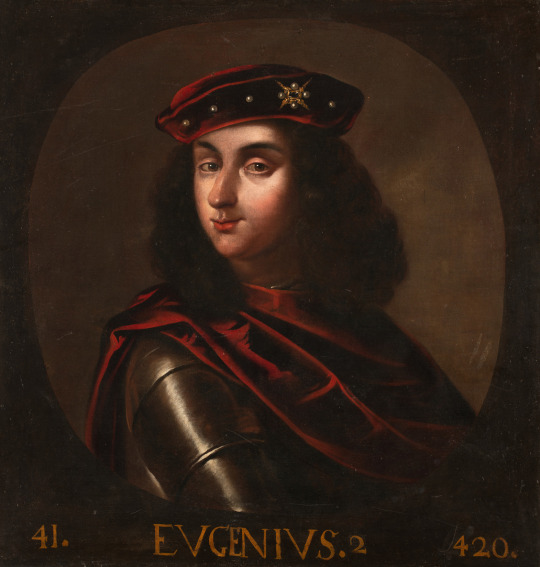
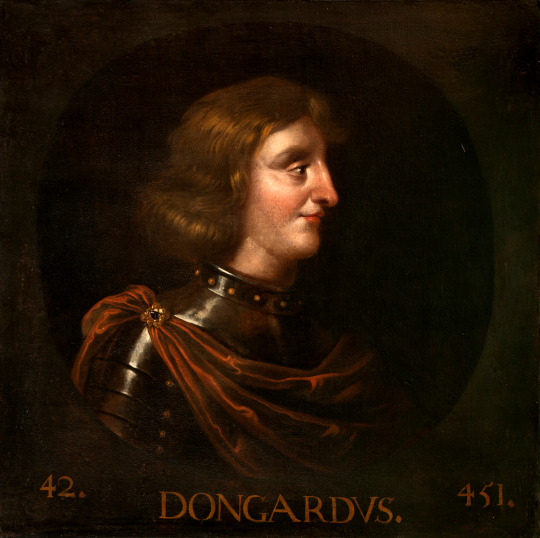

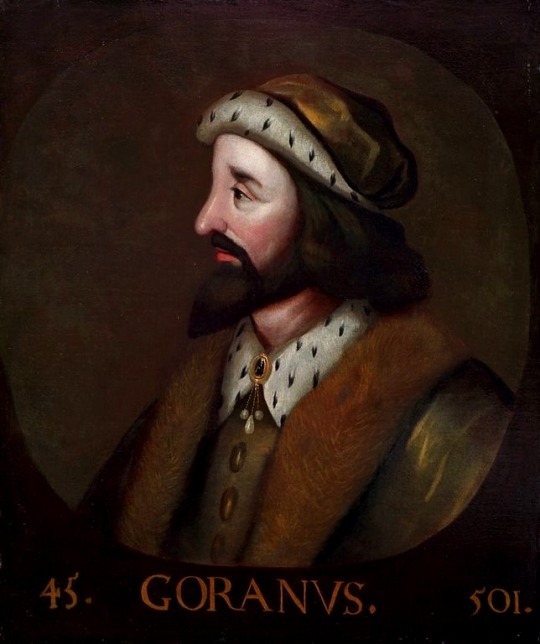
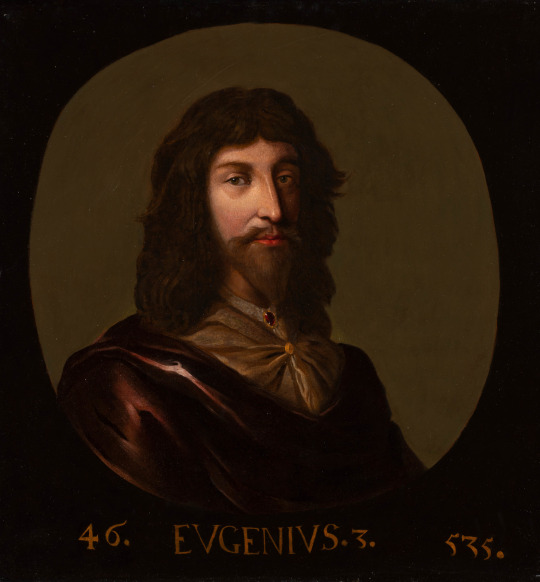
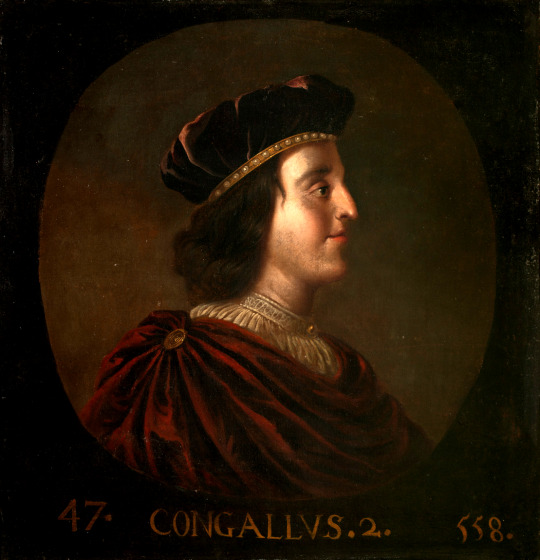
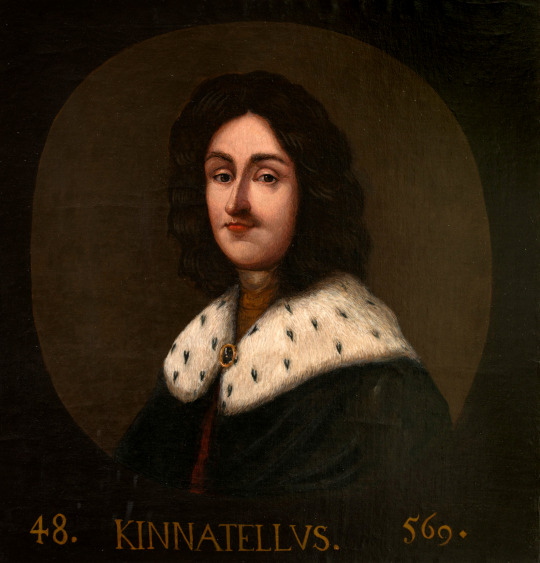
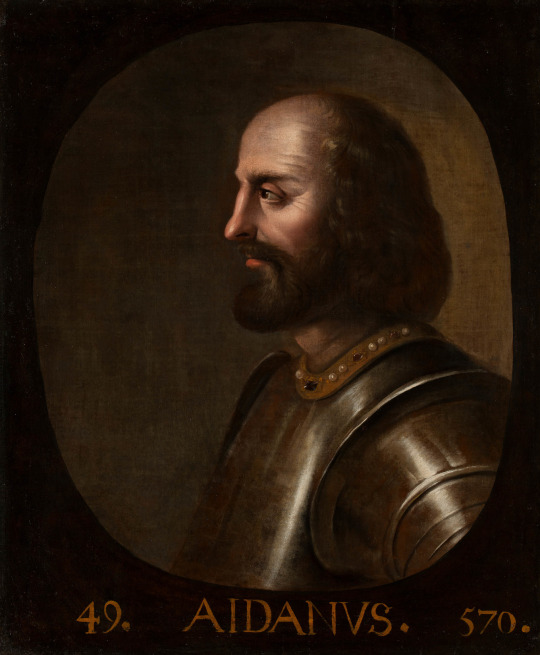
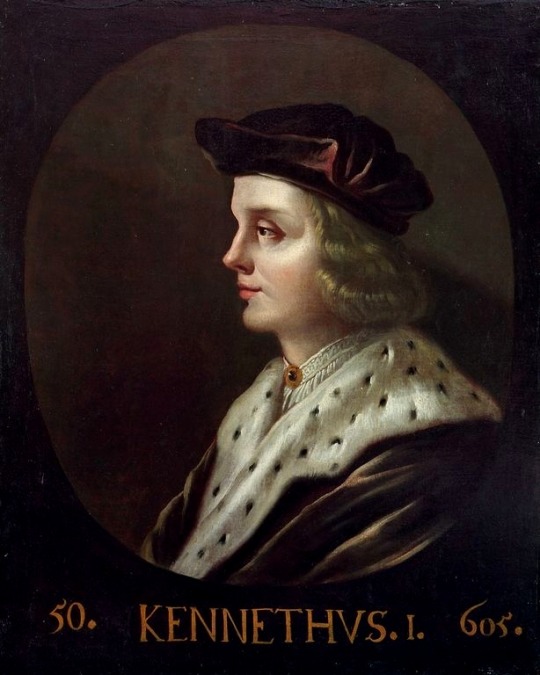
List of Monarchs: Legendary kings of Scotland. By Jacob Jacobsz de Wet II.
41. Eugenius II.
42. Dongardus (Domangart Réti, King of Dál Riata; 501-507).
44. Congallus I (Comgall mac Domangairt, King of Dál Riata).
45. Goranus (Gabrán mac Domangairt or Gabrán the Traitor, King of Dál Riata and Ulaid -Ireland-).
46. Eugenius III (Owain mab Urien was the son of Urien, king of Rheged. The historical figure of Owain became incorporated into the Arthurian cycle of legends where he is also known as Ywain. In his legendary guise he is the main character in Chrétien de Troyes's Yvain, the Knight of the Lion and the Welsh Romance Owain, or the Lady of the Fountain, which corresponds to Chrétien's poem.)
47. Congallus II (Conall mac Comgaill, King of Dál Riata from about 558 until 574).
48. Kinnatellus.
49. Aidanus (Áedán mac Gabráin, King of Dál Riata from c. 574 until c. 609 AD. The kingdom of Dál Riata was situated in modern Argyll and Bute, Scotland, and parts of County Antrim, Ireland).
50. Kennethus I (Kenneth I Keir; Connad Cerr or Connad the Left-handed, King of Dál Riata).
#Jacob Jacobsz de Wet II#gwran wradouc#list of monarchs of scotland#eugenius ii#dongardus#domangart réti#congallus i#comgall mac domangairt#goranus#gabran mac domangairt#gabran the traitor#kingdom of ulaid#kings of ireland#kingdom of ireland#king of ulaid#eugenius iii#owain mab urien#arthurian literature#ywain#arthurian cycle#congallus ii#conall mac comgaill#kingdom of scotland#george buchanan#kingdom of dalriada#rerum scoticarum historia#kennethus i#kenneth i keir#connad cerr#connad the left handed
10 notes
·
View notes
Note
I think this was mentioned in passing on another post that's currently buried in the thread.
But from what I gather, the MC is stronger than many of the Knights of the Round? Base wise, but more so when activating their magic?
Specifically, I think this was in reference to Urien. I don't know about how others viewed that whole interaction, but for me, it was just embarrassing on Urien's part.
I mean we call the MC hound, but that was clearly Urien trying to (pardon me) piss all over Camelot to stake a claim.
More dog jargon comes up when you know the MC must think, 'It's always the smallest dog with the loudest bark.'
Seriously though, It's going to be glorious when Urien realizes just how thoroughly outclassed the Knights are.
I picture the MC as a more show than tell person. Not the type to brag or be intimated by false bravado. Never one to really lower themselves to engage in pointless or petty squabbles.
Urien's behavior, that greasy passive-aggressive, weasel-like get under your skin mentality, is such weak bait.
I think this is a stark difference between the Irish and Welsh(?) Forces. The Irish forces seem almost guerrilla in their mentality with an anything goes approach.
While the Arthur and his forces seem constrained by this idea of honor and prestige. As if their deeds are more noble or just. They know war, but I don't think they realize just how much worse it could have gotten.
A war won, to what end?
Urien did posture like that, didn't she? You are correct that MC would overpower her, their combat magic even at this younger age puts them on another level, however Urien is in her element and unfortunately as much as Irish are versed in combat, Welsh are versed in politics.
Urien's power is in her status as Round Table Knight (so, with a significant influence in the name of the King) but also in the way she is connected to many at court and has control over them.
Though, some part of Urien's arrogance would definitely be tested by MC being able to defeat her while she thinks of them as a lost, annoying puppy. And while she might succeed in upsetting some MCs, some others can definitely level her with a stare that tells just how ineffective her threats are (the encounter was probably quite uncomfortable though)
101 notes
·
View notes
Text


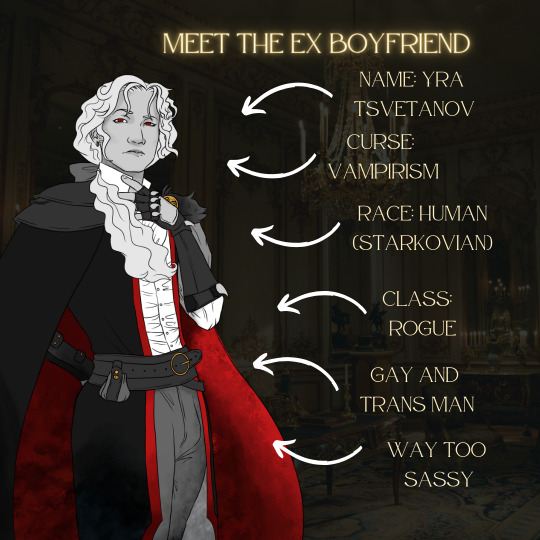

Meet the Cast of King of Dust
Darius, cursed with vampirism, embarks on a quest for redemption, but can he defy fate?
Darius Starbán, once the son of a great king, now grapples with the weight of centuries of mistakes and the curse of vampirism. His journey to atonement begins with an unlikely entourage -- Urien, the Cambion Inquisitor, Yra, his aristocratic ex-boyfriend, and Astrid, a newfound companion with secrets of her own.
This LitRPG fantasy blends comedy, magick, and LGBTQ romance into a gripping narrative. Can Darius rise above his mistakes, heal the wounds of Starkovia, and navigate the complex dance of his relationships without succumbing to his own curses?
The stakes are high, the path fraught with peril, and the only certainty is that Starkovia -- and Darius -- will never be the same again.
King of Dust is now out on Kickstarter!
#trans artist#trans artwork#art#digital art#oc#original character#publishing#self publishing#writing#authors of tumblr#writeblr#vampire#vampirism#vampire art#vampiric#vampcore#vampire core#vampire aesthetic#litrpg#dungeons and dragons#kickstarter
11 notes
·
View notes
Text
The fantasy in modern Arthuriana (2)
This is a loose translation of Claire Jardillier’s article “Les enfants de Merlin: le merveilleux médiéval revisité” (The children of Merlin: Medieval magic revisited), for Anne Besson’s study-compilation.
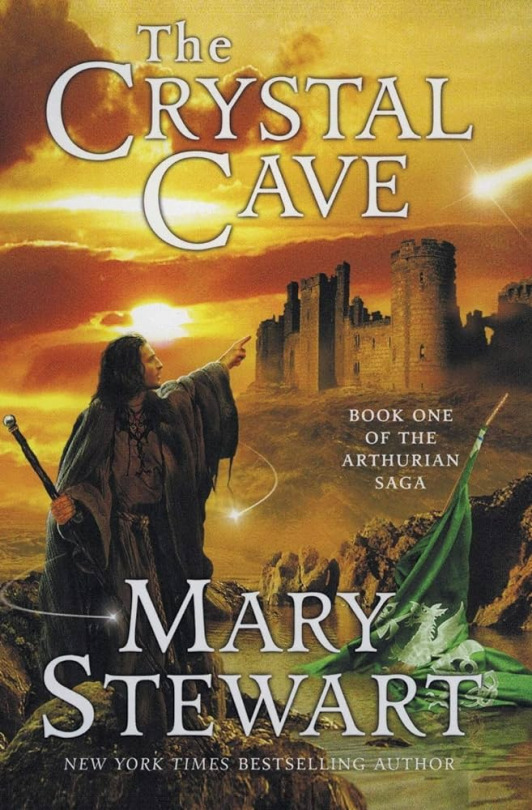
II/ Wizards and witches
The fantastical elements within modern rewrites are often embodied in the most visible way by a few key characters. First and foremost among this magical cast is, of course, Merlin the enchanter, but also regularly the bard Taliesin, despite his lesser presence within the Matter of Britain. Taliesin indeed only appears obviously tied to Arthur within the Welsh sources, especially “Preiddu Annwn”, where he is part of the expedition led by Arthur to steal away the cauldron of resurrection from the Otherworld. We can make the hypothesis that is it because of the historical rewrites of the Arthurian legends that the character of Taliesin gained such an importance, since it is in the Welsh sources that he is most frequently seen, sources that modern rewriters especially love due to judging them more ancient and thus more “authentic” and more Celtic than the chivalry romances and knighthood romans of France and England. Since Wales resisted more strongly to the Saxon invader, then to the Normand influence, modern novelists like to use the “Mabinogion” and the Welsh poems to historicize their Arthur. Taliesin usually stays within his traditional role of bard, in accord to the historical and bibliographical information we have about him. While quite brief, these information naturally designate him as the symbol of the Arthurian legend within a “realistic” rewriting, as a character between the history and the myth.
[In the “Hanes Taliesin” mainly, translated by Lady Charlotte Guest and which follows her “Mabinogion” translations, we discover the two births of Gwyon Bach/Taliesin, is exploits as a bard within the court of prince Elphin, and some of his poems. The historical Taliesin seems to have been a bard at the court of Urien Rheged during the 6th century, and the poems attributed to him were preserved within the “Llyfr Taliesin” (The Book of Taliesin). It notably contains the famous “Cat Godeu” (Battle of the Trees) and the previously mentioned “Preiddu Annwn”. These Welsh poems, like many others, were translated and published by William F. Skene within his “Four Ancient Books of Wales”]
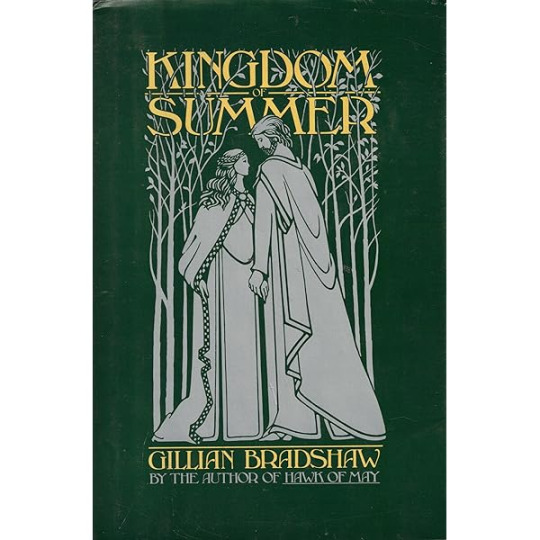
As such, within Fay Sampson’s “Daughter of Tintagel” cycle he becomes one of the five narrators that relate the life of Morgan. A first-person narration that give a voice to a secondary character of the medieval corpus is a fundamental trait of modern Arthurian literature : as such, we can hear Kai, Pelleas, Bohort, Rhys or Bedwyr, characters whose point of view is rarely given in legends, alongside the manifestation of more novel characters, such as Derfel, a shadowy warrior turned saint in the 6th century who narrates Bernard Cornwell’s “Warlord Chronicles”. [Respectively, Kai is heard within Phyllis Ann Karr’s The Idylls of the Queen and John Gloag’s Artorius Rex ; Pelleas within Stephen R. Lawhead’s Arthur and Courtway Jones’ In the Shadow of the Oak King ; Bohort within Dorothy Jane Roberts’ Launcelot my Brother ; Rhys within Gillian Bradshaw’s Kingdom of Summer ; Bedwyr within Catherine Christian’s The Sword and the Flame and Stephen R. Lawhead’s Arthur.]
Within Stephen Lawhead’s works, the role of Taliesin is more developed since he becomes the father, and so the precursor of Merlin (within Marion Zimmer Bradley’s, he is Merlin’s first incarnation). In his trilogy, the bard Talesin paves the way for Merlin, who will surpass his father in his role as the companion of the major hero, Arthur king of Britain. It is precisely this dimension that is often used by modern Arthurianists. [Stephen R. Lawhead wrote in reality five novels, the last two being a flash-back to episodes from between book 2 and 3. This Arthurian cycle is especially concerned with the questions of filiation, legitimacy and predestination. As such, Taliesin announces and foreshadow the coming of his son, a sort of messiah for the Britons, but Merlin himself works for the coming of Arthur, the savior of Britain as much on a spiritual level (the writings of Lawhead are distinctly Christian in tone) as on a political level. It is probably why we also see here a weird and exceptional element introduced, as Arthur is made the posthumous son of Aurelius, and not the bastard of Uther. Here Arthur is the product of an union blessed by the Church, and as such he descends from the first High-King, not from his replacement out of a “side-branch” of the family.]
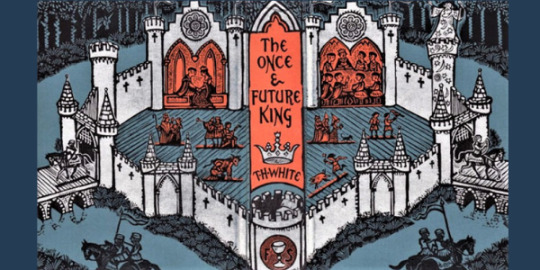
We also have to note that modern rewrites love to tell what happened during the life of characters in the form of prequels – in this case, the youth of Merlin, which is rarely detailed in the Middle-Ages outside of his birth and his encounter with Vortigern. It was the case within Mary Stewart, the first author who was concerned with the wizard’s youth, and who sems to have deeply marked modern Arthurianists, since the same pattern can be found in other novels, including those of Stephen Lawhead. This concern with “what happened before” is not exclusively Arthurian, and can be seen within other contemporary sagas – Star Wars, Indiana Jones, Blueberry… It is a tradition as old as the various “Childhoods” texts of the Middle-Ages. [Mary Stewart wrote “The Crystal Cave”, “The Hollow Hills” and “The Last Enchantment”. As a proof of the intertextuality of Arthurian novels, “the last enchantment” is an expression reused and exploited by Bernard Cornwell in the last part of his trilogy, where a dying Merlin, entirely devoured by his own student Nimue, preserves a “last enchantment” to allow Arthur and a few others to escape the battle of Camlan]
Be it Taliesin or Merlin, the first way the question of the magic implants itself within the narrative device is about the relationship between the king and his wizard. The magical element is thus tied to the political power, weighed down by a reality which, if not historical, is at least coherent. This heirloom is directly tied to the medieval sources, even if it is not obvious at first. The idea of an Arthur raised as a boy by Merlin owes much more to T.H. White’s “The Once and Future King” than to the medieval texts, where only a slow and complex evolution allowed the association of those two characters now seen as undividable. [White’s work is a set of five novels, first published separately, then compiled as one work in the 50s, and to which the last novel, The Book of Merlin, was added in 1977. This work is a precursor of all the rewrites that happened from the 60s onward, especially the first book that tells of Arthur’s childhood and his education by Merlin. It was a best-seller, and the adaptation of this first novel into an animated movie by Disney (63’s The Sword in the Stone) amplified its impact]. Indeed, within Geoffroy of Monmouth, Merlin and Arthur follow each other in the text… but never meet. It was within later rewrites, Wave, Lawamon, and in the French “Lancelot-Graal”, that the king and the enchanter will develop a more intimate relationship, culminating within Malory’s Morte Darthur. [In Geoffroy’s tale, the two characters at least never meet within the context of the tale. A doubt is allowed since in most of the manuscripts, Merlin makes a brief apparition at the very end of the “Historia”, where an “angelic voice” talks to Cadwallader, telling him that “God wishes that the Britons stop ruling within Britain until the moment that Merlin prophesized to Arthur” ; this sentence implies that Merlin might have been the king’s prophet, a role that will become more and more obvious in later rewrites]
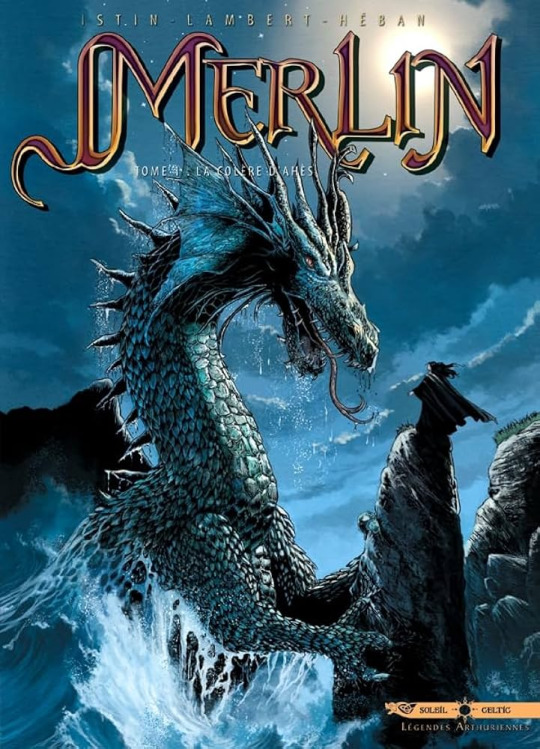
This is due to the two characters, Merlin and Arthur, originally belonging to two distinct traditions. Once they became connected thanks to Geoffroy’s Historia Regum Britaniae, the two characters got closer and closer, and gained many interactions, just as Merlin’s interventions became more and more fantastical. This is very clear when we look at an episode shared by all the medieval Merlinian tales: the moving of the stones of Ireland to create Stonehenge. Within Geoffroy’s, it is a mechanical process. Within Wace, an unexplained way. Finally, within Lawamon, it becomes a powerful spell that makes the stone “as light as feathers”. Modern authors follow this tradition and often reuse this episode, or a similar one, in what we can call “the motif of the dancing stones”. In the same way, within Lawhead’s novel, a child Merlin proves his powers to an assembly of druids by making the stones of a cromlech levitate. Stonehenge plays an important role for Cornwell: it becomes the place of a ghost-filled ceremony during which Merlin gives Excalibur to Arthur. Even among comic books, Merlin makes stones dance before amazed mortals. [It is within the first volume of the BD series “Merlin” by Jean-Luc Istin and Eric Lambert, “La colère d’Ahès” (The Wrath of Ahès). The dancing stones of Istin and Lambert are quite similar to the ones described by Lawhead, and the scenarist confessed having read the “Pendragon Cycle”. We find in this “Merlin” the same habt of syncretizing religions as within Lawhead’s works (father Blaise is a former druid, and offers Merlin as a symbol of the union of religions).]
We find back here what we said before: the historicized Arthurian literature of the 60s-80s greatly deprived the medieval text of their fantasy, and since the 80s-90s we have a slow re-appropriation of the medieval magic within novels that still, however, wish to be historical. In other terms – the stones are dancing again, but they are always dancing in a mentioned 6th century.
Before Lawamon, Merlin only acted during the lifetime of Aurelius and Uther, before disappearing for no reason after Arthur’s birth. However, the encounter between those two historical characters was too tempting to be avoided, and we can see a true shift between Geoffroy and Malory (for example), which today leads to the many tales in which Merlin acts as the teacher, tutor, or even adoptive father of Arthur. This filiation is helped by two elements. On one side, that is an elliptic moment covering Arthur’s childhood in medieval texts, and we go from him as a baby to him as a young fifteen-year old king. [We find within Lawamon the beginning of an explication: child-Arthur was raised by elves at Avalon. This idea was reused by Parke Godwin within the novel “Firelord”.] On the other hand, we can see that all of his next of kin die around the same time. In front of this absence of parents, it is very tempting to remove Ector (the father of Kay and the tutor of the royal child in the tradition) and put in his place a more familiar and impressive character, Merlin the wizard.
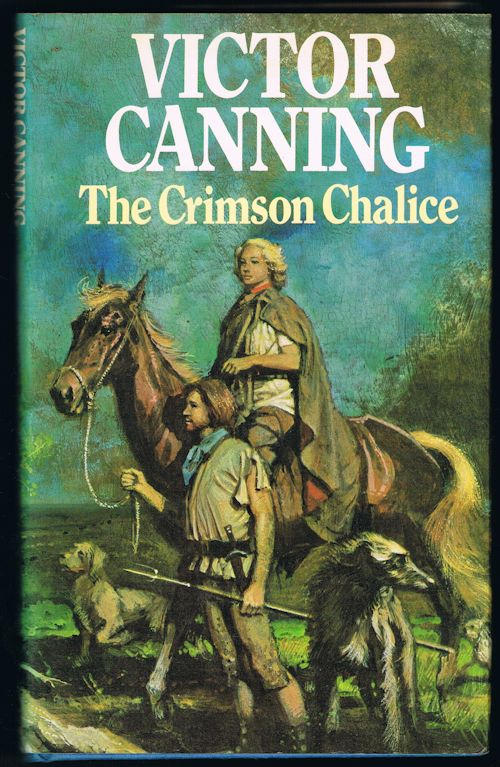
We talked before of the habit of “prequels”: the cyclical temptation of modern novels, which in a way mimics the Arthurian medieval tradition of a condensed and fractioned writing of the whole Arthurian legend (usually in three volumes), favorizes the writing of the origins, of the “before Arthur”. The introduction of Merlin, but also of Taliesin, proves this attraction for what Anne Besson calls an “Arthurian prehistory”. For Stephen Lawhead, the link between the various generations (Taliesin, father of Merlin, Merlin spiritual father of Arthur) insists upon the greatness and the predestination of the king of the Britons, the bearer of Light. Even when the Arthurian tale is limited to a single novel, it is not unusual to see it begin with the generation before Arthur: it was the case with Victor Canning’s “The Crimson Chalice”, where a third of the novel follows the events that led to Arthur’s birth (even though here Arthur’s parents are named Tia and Baradoc, and bear no resemblance to Igraine or Uther).
To all the reasons described above, we must add the fictional temptation of having characters coexisting to allow a powerful confrontation. But this temptation also bears a prevalent trait of the modern Arthurian fiction, and of its dialogue with the sources. Indeed, it is not uncommon to see a rearrangement, to various degrees, of the links that traditionally unite the characters. As such, in most sources Ygerne is the wife of Gorlois and the mother of Arthur, but she can be his half-sister and the mother of Medraud within Rosemary Sutcliff’s “Sword at Sunset”. The same Ygerne becomes Gorlois’ daughter, not his wife, in Stephen Lawhead’s work, as the author plays with the writing of the myth, has his Merlin-narrator laugh about the mad rumors that circulated about the siege of Tintagel “I have even heard it said that Ygerna was Gorlas’ wife – Imagine that!”). The marvelous does not escape this kind of more-or-less extreme shifts: the case of the female characters, of their relationship to magic, and of their role within history is especially revealing.
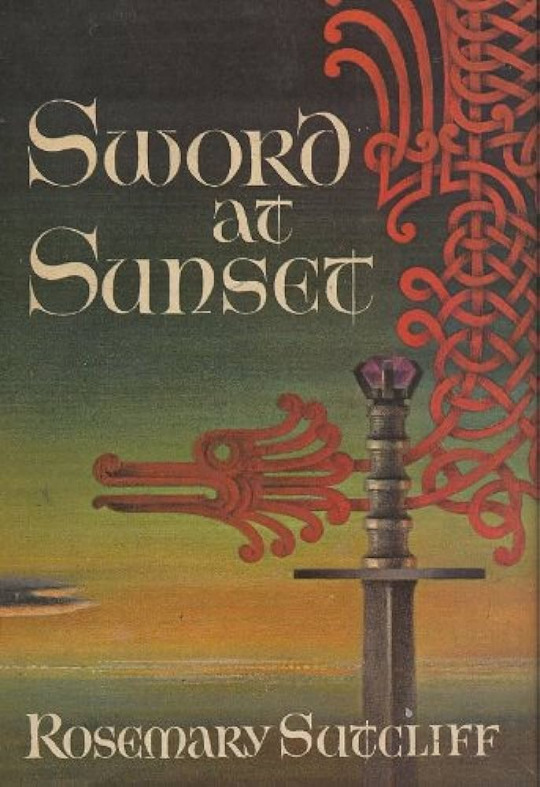
#arthuriana#fantasy#arthurian novel#fantasy novel#arthurian literature#translation#merlin#king arthur#taliesin#magic#arthurian rewrites#merlin the enchanter
10 notes
·
View notes
Text






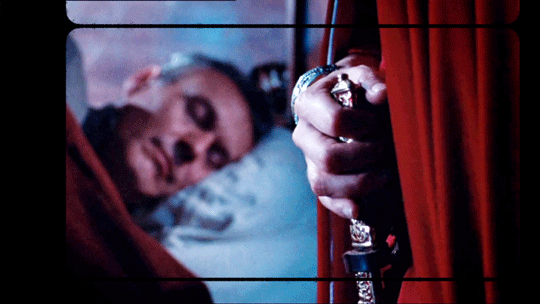
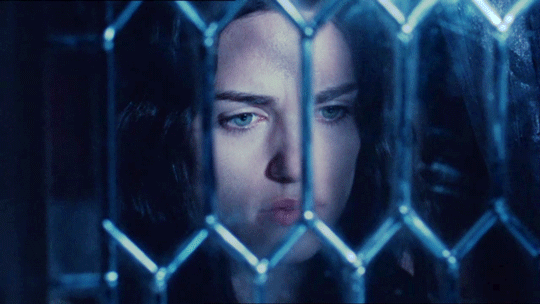
This Coldness of the Blade by @the-king-and-the-druidess
Legends say that Lady Morgana was so unhappy in her marriage that she killed her husband, King Urien. This terrible accusation is true. But why did she do it?
8 notes
·
View notes
Text
The French Arthurian Narratives really, really, really don't gel with Welsh Law.

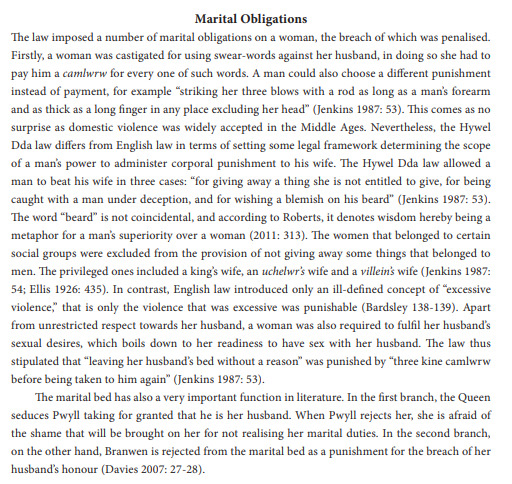
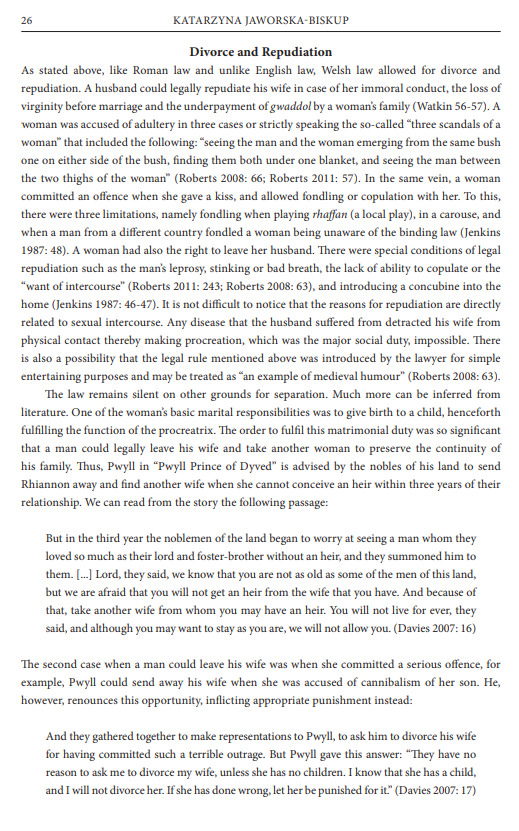

So basically:
Morgan would have just divorce Urien using any bullshit excuse, backed up by magic.
Lancelot would've just paid blood-money for damages done to Arthur and Gawain's kin. (Not that it would stop Gawain if Gareth - and specifically Gareth - is killed, but still)
Guinevere would have just been divorced, beaten and/or humiliated like Rhiannon, but death penalty would have been unnecessary and excessive, especially if Arthur's sympathetic to his wife.
Arthur and Guinevere could've initiated divorce anytime for any reason. Especially, when there's a seven-year time period of cohabitation that determines whether or not Gwen is entitled to half of Arthur's property. Childless!Guinevere really makes it even questionable that Guinevere could've kept her queenship past three years, much less seven.
So, all in all, the Arthurian story we know and love only works if its culturally the French High Middle Ages (12-13th Century)
#sir lancelot#cyfraith hywel#welsh law#king arthur#arthuriana#arthurian legend#arthurian legends#arthurian mythology#queen guinevere#vulgate cycle#le morte d'arthur#morgan le fay#celtic law#urien of rheged#lancelot grail#hywel dda
38 notes
·
View notes
Text
Servant Oc concept for a Rider Accolon, this version is tied to the Wild Hunt. Each stage represents an era in his life.
1. Surviving in the wilderness after his kingdom has fallen due to bad harvest season and the king incompetence. Was just a prince under his father, Urien.
2. After meeting Morgan, he agrees to go and infiltrate the Knights of the Round, quickly becoming known as Beast Tamer Accolon.
3. Is his armor when he and King Arthur had their final duel. Years upon building up the first generation of the Wild Hunt, recruiting commen folk who were displease with the kotr and the king
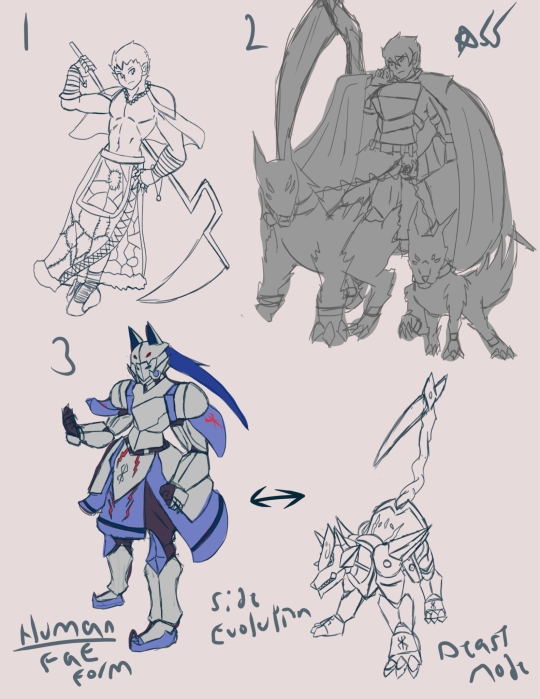
10 notes
·
View notes
Text
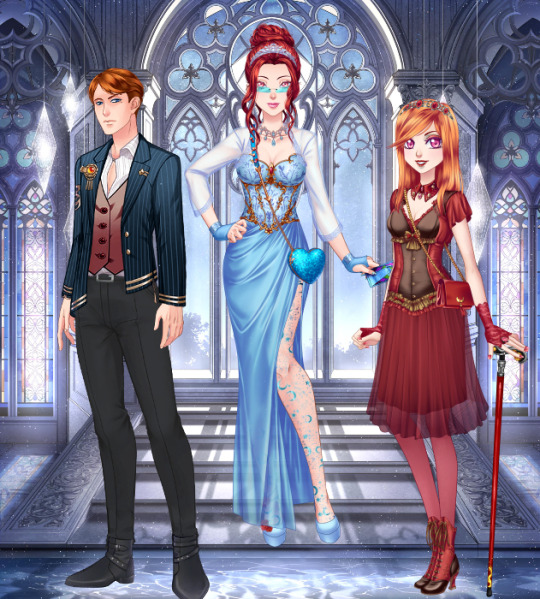
The Royal Children of Astaria
Ariadne Victoria Astier (in the center) is the Crown Princess and the next Queen. She is King Julius' and Queen Sophia's eldest. She looks like a female version of her father. She wants to make the aristocracy remember their jovial roots.
Urien Edward Astier is King Julius' and Queen Sophia's only son. They thought they were finished having children when he was born... But fate had other plans! He looks like a male version of his mother. He's very elitist.
Lena Astrid Astier is the youngest. She both benefits from the Aristocratic system, and isn't happy with it...
Credits:
@candysweetposts for the pack used to make Urien
Love Nikki for the background
ChiNoMiko and Beemoov for My Candy Love
#my candy love#mcl#amour sucre#sweet amoris#sweet love#corazon de melon#sweet crush#corazon de bombon#amor doce#sweet flirt#the melancholy of melody alana roster#my candy love love life#my candy love university life#mclul#mclll#my candy love oc#mcl oc
12 notes
·
View notes
Text
Arthur: Uriens! your wife, my sister, is a menace. But Accolon told me that she would’ve killed you too. I dont trust your son tho so he’s banished now.
Owain: what
Gawain: if you banish my cousin, then you banish me too! Bye!
Gaheris: oof
#arthuriana#king arthur#king uriens#sir gawain#sir owain#morgan le fay#le morte d'arthur#heli blobbing
3 notes
·
View notes
Text
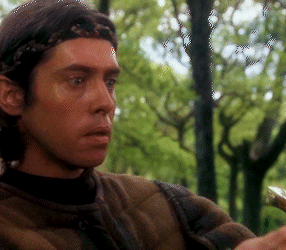
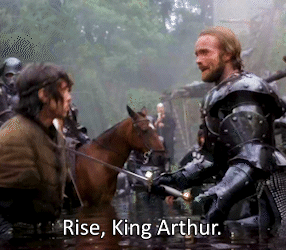

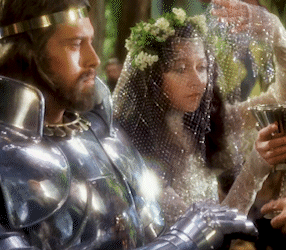
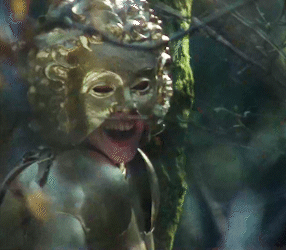

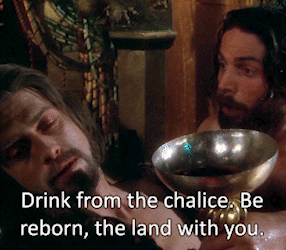
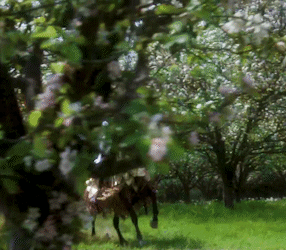
Excalibur (1981) | Directed by John Boorman
Arthurian Film List | Arthurian Show List | Movie review below the cut ⤦
Star rating: 10/10
Content warning: multiple rape scenes, heavy gore throughout, elements of horror, nudity, animal brutality (horses in battle are treated roughly)
Overview: Writer and director John Boorman understood the assignment. It's evident this film was a passion project. Both of his children are in it (his daughter as Igraine, his son as young Mordred) and he had been working with J. R. R. Tolkien back in the 70s on an adaptation of Lord of the Rings which fell through, and much of those elements were revived and put to use here. The script, acting, score, and cinematography meet the epic demands an Arthurian film requires to succeed.
Synopsis: The film opens with Uther before he meets Igraine and goes on to detail the entirety of Arthur's reign and life. Arthur's beginnings with Ector and Kay are very sweet and culminate in his pulling the sword in the stone and meeting a fun, quirky Merlin. The wizard trains Arthur up and he's eventually knighted by Urien and makes an ally of him while defending Leodegrance and Guinevere's castle. Arthur falls in love with Guinevere and intends to marry her, but first meets and battles Lancelot, wins his loyalty, and sends him to pick Guinevere up for the royal wedding. Meanwhile Morgan learns magic from Merlin and uses it to conceive Mordred with Arthur. After the royal wedding, the love affair between Lancelot and Guinevere begins. While staying away from Camelot, Lancelot meets country bumpkin Perceval, who follows Lancelot back to Camelot from his secluded woodland home, then takes up the mantle of Gareth Beaumains by working for Kay in the kitchens and champions Guinevere against Gawain until Lancelot can arrive. After the affair between he and Guinevere is found out, Lancelot runs off mad into the woods, and Arthur's prosperity declines. Perceval begins a decade-long quest in search of the Holy Grail to restore Arthur/Fisher King's health so he can reclaim his lands now ravaged by disease. Mordred has grown up in this time and been taught by Morgan to hate Arthur. Once Arthur has been cured, he goes to find Guinevere in the abbey where she had been living, and retrieves Excalibur, which she had been keeping safe for him all that time. Arthur then goes with his remaining knights to battle Mordred, where he is mortally wounded, and Perceval fulfills his final act for his king by returning the sword to the Lady of the Lake as Arthur is spirited away to Avalon.
Final thoughts: This movie is so damn good. Nobody's doing it like Boorman. It's my favorite version of the grail quest. Very horror, as it should be. (Monty Python is a different tone, not a worse one!) I love everyone's acting here, the casting is so rich, I love the look and vibe of everyone, the Shakespearean line delivery. All of it. The gaudy green lighting is so 80s but it works, it sets a tone, it commits to the bit, illuminates every magical scene. And the armor is obviously incredible. I won't hear criticism. Either you get it or you don't. You can watch an entire mini-series about the armorer, Terry English, produced by Mythbuster's Adam Savage on YouTube, here. And if you want to learn more about Mordred's cool helmet specifically, watch here. Anyway please watch this, you won't be disappointed.
#arthurian legend#arthurian legends#arthuriana#excalibur#excalibur 1981#excalibur (1981)#john boorman#king arthur#queen guinevere#sir lancelot#sir perceval#sir percival#morgan le fay#sir mordred#movie review#film review#gifset#gifs#animated gifs#animated gif#quotes#gifs i made#my post
299 notes
·
View notes
Text
Summary of Le Morte D'Arthur by Thomas Mallory
Chapter I: How Uther Pendragon sent for the duke of Cornwall and Igraine his wife, and of their departing suddenly again. OR The Time Uther Pendragon started a war because he was horny
When Uther Pendragon was king, he sent for the Duke of Cornwall to come visit him. He invited his wife, Igraine, as well because she was supposed to be hot. When they arrived, they were treated well and Uther decided that Igraine was indeed hot and wanted to sleep with her. Since she was, you know, married, she said no and then told her husband that she was pretty sure they had been invited just so the king could sleep with her. They decided to leave quickly and without telling anyone. This pissed the king off. The king’s advisors told him to summon the Duke and his wife again and if they didn’t come, then he would have a reason to declare war. He sent for them, they obviously didn’t return, and King Uther Pendragon declared war on the Duke of Cornwall, saying he would attack his biggest castle in 40 days time.
The Duke decided to get two of his castles ready for war and put his wife in one while he stayed in the other. Uther attacked the castle that the Duke was in and a lot of people died. The king got such bad blue balls that it was noticeable to his knights and one of his knights, Ulfius, asked him what was up. Uther said he was so in love with Igraine that he’d gotten sick. Ulfius told him that Merlin would help him. Ulfius went off and found Merlin and Merlin said that he’d help as long as he got rewarded. Ulfius said that he was sure the king would reward him, so Merlin agreed to help.
Chapter II. How Uther Pendragon made war on the duke of Cornwall, and how by the mean of Merlin he lay by the duchess and gat Arthur OR How Uther and Merlin are the real villains here
Ulfius brought Uther to Merlin. Merlin told Uther that he’d help him get laid on the condition that he get the child that he had with her. Uther agreed. Merlin told Uther to head to the other castle where Igraine was and that he would look like the Duke to everyone and his knights would look like the Duke’s knights. He said not to talk too much, but to just sleep with her and then stay in bed until he came by in the morning. After Uther left, but before he arrived at the other castle, the Duke was killed.
Uther then slept with Igraine while she thought he was the Duke and impregnated her. The Merlin came by in the morning and Uther left with him. Later, Igraine learned her husband had died at the castle and started wondering who she had slept with then and mourned her now dead husband. With Ulfius as a messenger, it was arranged that Uther and Igraine get married.
King Uther had King Lot marry Margawse who was Sir Gawaine’s mother. He also had King Nentres marry Elaine. They were sisters and the third sister was Morgan Le Fay who he sent to a nunnery where she became a necromancer. Later, she married King Uriens who was Sir Ewain’s father.
Chapter III: Of the birth of King Arthur and of his nurture OR Possibly the least believable bit so far
Eventually it became really obvious Igraine was pregnant and Uther asked who’s kid it was. Igraine was embarrassed, but Uther said he just wanted the truth and wouldn’t judge her for it. Igraine told the story of how someone had impersonated her husband to sleep with her. Uther was like “Yeah, thanks for being truthful. That was me and Merlin told me to do it.” This apparently made Igraine happy, but I’m not sure I believe the author here.
Merlin came by and claimed the kid like he said he would. Merlin gave the kid to Sir Ector, but had Sir Ector come to court for a while while Igraine was still pregnant so that Uther could see that his child would be in good hands. The king gave Sir Ector a bunch of nice stuff for raising his kid for him. When the child was born, he wrapped him in gold and then told some servants to take him to the poor man outside the castle. For some reason they actually did this and it was fine because the poor man was Merlin who then gave the kid to Sir Ector and they christened him Arthur.
Chapter IV: Of the death of King Uther Pendragon
Less than two years later, Uther got sick. His enemies took advantage of his weakness and killed a bunch of his people. Merlin told him to get his ass up and to be taken to the battlefield to be there in person because that was the only way they could win. For some reason, this worked and they won. Uther lost his ability to speak three days later. Merlin said he couldn’t do anything about it because it’s God’s will, but he would make him speak tomorrow. The next morning, Merlin asked him if Arthur would be the next king and Uther replied saying that he would and then immediately died.
Chapter V. How Arthur was chosen king, and of wonders and marvels of a sword taken out of a stone by the said Arthur. Or How Arthur’s brother’s forgetfulness made Arthur king
Obviously this created a power vacuum since Arthur was all of 2 and also no one knew where he was. Merlin made all of the lords and gentlemen of arms gather in London by Christmas by threatening to curse them if they didn’t show up. A bunch of religious stuff that doesn’t really matter in here, but after mass on Christmas they all go to see a giant stone with a sword stuck in it. Writing on the sword said “Whoso pulleth out this sword of this stone and anvil, is rightwise king born of all England.” Everyone was suitably amazed by this. No one was allowed to touch it until high mass was done though. After that, a bunch of people tried to remove the sword, but no one was able. The Archbishop went “Well no one here is king, but God will make him show up eventually, so we’ll just set up a guard of knights for now.” On New Year’s Day they was a tourney and everyone figured that was when he would show up.
On New Year’s Day, Sir Ector showed up for the tourney with his two sons, Sir Kay and Arthur. Sir Kay had forgotten his sword and asked Arthur to go get it for him. Arthur couldn’t get the sword because no one was home, so he decided to go get the sword he’d seen stuck in a stone for his brother. All of the knights were at the tourney, so he just pulled out the sword and brought it to Sir Kay. Sir Kay recognized it and immediately went to get Sir Ector. Sir Ector also recognized it and all three of them went back to the church. Sir Ector made Sir Kay swear on the bible where he’d gotten it and he told the truth that Arthur had given it to him. Arthur told his story of how he got it. Sir Ector basically went “Welp, I guess you’re king then.” Arthur was confused and didn’t think it was a big deal that he could move the sword, so Sir Ector had him put it back and then Sir Ector tried to move it and couldn’t.
2 notes
·
View notes